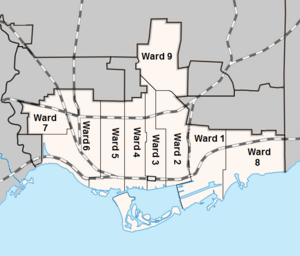Municipal elections were held in Toronto, Ontario, Canada, on December 5, 1966. The elections were the first for Toronto after its merger with several smaller suburban communities on January 1, 1967. Forest Hill and Swansea were annexed by the City of Toronto, Leaside was merged with the Township of East York to become the Borough of East York. Weston was combined with the Township of York to form the Borough of York. The Village of Long Branch and the towns of Mimico and New Toronto were merged with the Township of Etobicoke to form the Borough of Etobicoke.
Municipal elections were held in Toronto, Ontario, Canada, on December 7, 1953. Incumbent mayor Allan Lamport won an unexpectedly close race against school board trustee Arthur Young. This election was the first for councils in the municipality of Metropolitan Toronto which would be created on January 1, 1954 and was composed of 14 municipalities: the City of Toronto, the towns of New Toronto, Mimico, Weston and Leaside; the villages of Long Branch, Swansea and Forest Hill, and the townships of Etobicoke, York, North York, East York, and Scarborough.
Municipal elections were held in Toronto, Ontario, Canada, on December 1, 1952. Incumbent mayor Allan Lamport easily won against former alderman Nathan Phillips.
Municipal elections were held in Toronto, Ontario, Canada, on December 3, 1951. Allan Lamport defeated incumbent Hiram E. McCallum in the mayoral election.
Municipal elections were held in Toronto, Ontario, Canada, on December 4, 1950. It was the second time the elections were held in December ; traditionally elections occurred on New Year's Day. Incumbent mayor Hiram E. McCallum narrowly defeated Allan Lamport. The defeat of Norman Freed and the failure of Charles Sims to regain his seat would bring to a close the communist Labor-Progressive Party's presence on Toronto's City Council though the party, and its successor, the Communist Party of Canada would continue to elect members as school trustees for several decades.
Municipal elections were held in Toronto, Ontario, Canada, on January 2, 1950. This was the last time election were held in January, as a ballot measure passed changing the election date to the first Monday in December. This attempt to increase turnout went into effect immediately and an election was held December 4, 1950. The central issue of the campaign was whether to legalize sport on Sundays, with Controller Allan Lamport the main proponent. A referendum was held on the subject, and it passed by a slim margin.
Municipal elections were held in Toronto, Ontario, Canada, on January 1, 1949. Hiram E. McCallum was elected to his first full term as mayor.
Municipal elections were held in Toronto, Ontario, Canada, on January 1, 1948. Robert Hood Saunders was re-elected as mayor in an election that also saw no changes on the Board of Control or City Council.
Municipal elections were held in Toronto, Ontario, Canada, on January 1, 1947. With little serious opposition Robert Hood Saunders was re-elected as mayor.
Municipal elections were held in Toronto, Ontario, Canada, on January 1, 1946. Incumbent Robert Hood Saunders was acclaimed as mayor.
Municipal elections were held in Toronto, Ontario, Canada, on January 1, 1945. Controller Robert Hood Saunders defeated incumbent Frederick J. Conboy to be elected mayor.
Municipal elections were held in Toronto, Ontario, Canada, on January 1, 1943. Incumbent Frederick J. Conboy was acclaimed as mayor. There was a very low voter turnout, but the election was a victory for the left as the Co-operative Commonwealth Federation (CCF) and Communist Party each won two seats.
Municipal elections were held in Toronto, Ontario, Canada, on January 1, 1942. Incumbent Frederick J. Conboy was acclaimed as mayor.
Municipal elections were held in Toronto, Ontario, Canada, on January 1, 1941. Frederick J. Conboy was elected mayor.
Municipal elections were held in Toronto, Ontario, Canada, on January 1, 1940. Incumbent Ralph Day was re-elected mayor. The election saw little change with all incumbent councillors and Board of Control members being reelected.
Municipal elections were held in Toronto, Ontario, Canada, on January 2, 1939. Incumbent Ralph Day was re-elected mayor over former lawyer Lewis Duncan.
Municipal elections were held in Toronto, Ontario, Canada, on December 7, 1936, after being moved up from the traditional New Year's Day vote. William D. Robbins was easily elected mayor to his first full term in office.
Municipal elections were held in Toronto, Ontario, Canada, on January 1, 1936. Sam McBride was elected mayor in a three-way race in which incumbent James Simpson finished third.
Municipal elections were held in Toronto, Ontario, Canada, on January 1, 1935. James Simpson won a surprise victory in the mayoral campaign to become the first socialist candidate elected to the office.



